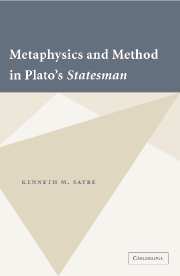Book contents
- Frontmatter
- Contents
- Acknowledgments
- Introduction
- PART I METHOD
- PART II METAPHYSICS
- 7 Excess and Deficiency in General
- 8 The Great and the Small in Plato's Dialogues
- 9 The Generation of Everything Good and Fair
- 10 Accuracy in the Art of Dialectic
- 11 Division According to Forms
- 12 The Metaphysics of Division
- Appendix: Equivalents for the Great and the Small in Aristotle and His Commentators
- Bibliography
- Index Locorum
- Index of Names
- General Index
10 - Accuracy in the Art of Dialectic
Published online by Cambridge University Press: 23 November 2009
- Frontmatter
- Contents
- Acknowledgments
- Introduction
- PART I METHOD
- PART II METAPHYSICS
- 7 Excess and Deficiency in General
- 8 The Great and the Small in Plato's Dialogues
- 9 The Generation of Everything Good and Fair
- 10 Accuracy in the Art of Dialectic
- 11 Division According to Forms
- 12 The Metaphysics of Division
- Appendix: Equivalents for the Great and the Small in Aristotle and His Commentators
- Bibliography
- Index Locorum
- Index of Names
- General Index
Summary
Knowledge and Art in the Philebus
In a seemingly offhand remark at Statesman 284D1–2, the Stranger alludes to a forthcoming “exhibition” (ἀπόδειξιν) of exactness itself and says that on this occasion there will be need for the distinction between two kinds of measurement that he and YS have been discussing. As pointed out during our initial encounter with this passage in section 7.1, there is an examination of accuracy among the arts at Philebus 55D–59D that apparently answers to the Stranger's prediction. Not only does this examination of accuracy make use of a distinction between two types of measurement very much like that in the Statesman, it also deals at length with the topic of dialectic which is the Stranger's main concern in the passages directly following the prediction.
Whether or not Plato had the Philebus (or plans for it) in mind when assigning this remark to the Eleatic Stranger, its treatment of accuracy in the arts is obviously relevant to the discussion underway at the middle of the Statesman. The task of the present chapter is to bring Socrates' examination of accuracy to bear in setting the stage for a discussion in the following chapter of the procedure of dividing according to Forms.
To someone accustomed to a sharp distinction between knowledge (ἐπιστήμη) and art (τέχνη) in other Platonic contexts, it may seem disorienting to find dialectic referred to as an art in the Statesman and the Philebus.
- Type
- Chapter
- Information
- Metaphysics and Method in Plato's Statesman , pp. 191 - 205Publisher: Cambridge University PressPrint publication year: 2006



